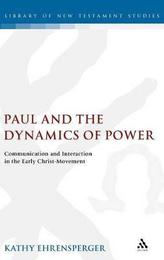
|
Paul and the Dynamics of Power: Communication and Interaction in the Early Christ-Movement
Hardback
Main Details
| Title |
Paul and the Dynamics of Power: Communication and Interaction in the Early Christ-Movement
|
| Authors and Contributors |
By (author) Dr. Kathy Ehrensperger
|
| Series | The Library of New Testament Studies |
|---|
| Physical Properties |
| Format:Hardback | | Pages:250 | | Dimensions(mm): Height 234,Width 156 |
|
| Category/Genre | Biblical studies |
|---|
| ISBN/Barcode |
9780567043740
|
| Classifications | Dewey:227.06 |
|---|
| Audience | | Professional & Vocational | |
|---|
|
Publishing Details |
| Publisher |
Bloomsbury Publishing PLC
|
| Imprint |
T.& T.Clark Ltd
|
| Publication Date |
1 September 2007 |
| Publication Country |
United Kingdom
|
Description
In this illuminating study Kathy Ehrensperger looks at the question of Paul's use of power and authority as an apostle who understands himself as called to proclaim the Gospel among the gentiles. Ehrensperger examines the broad range of perspectives on how this use of power should be evaluated. These range from the traditional interpretation of unquestioned, taken for granted for a church leader, to a feminist interpretation. She examines whether or not Paul's use of power presents an open or hidden re-inscription of hierarchical structures in what was previously a discipleship of equals. Paul and the Dynamics of Power questions whether such hierarchical tendencies are rightly identified within Paul's discourse of power. Furthermore it considers whether these are inherently and necessarily expressions of domination and control and are thus in opposition to a 'discipleship of equals'? In her careful analysis Ehrensperger draws on such wide-ranging figures as Derrida, Michel Foucault and James Scott. This enables fresh insights into Paul's use of authority and power in its first century context.
Author Biography
Kathy Ehrensperger is Research Professor New Testament in Jewish Perspective, Abraham GeigerCollege, at the University of Potsdam, Germany.
ReviewsMention - New Testament Abstracts, Vol. 52 No. 3, 2008 "Overall the book is well written and extremely well researched. The author particularly shines when discussing contextual backgrounds for the various topics in the study. Ehrensperger's understanding of Paul's Jewish background and the context out of which Paul fulfills his apostolic calling is especially beneficial. The book is worth reading alone for the backgrounds provided on ancient education, family groups, and social networks. Ehrensperger integrates sociological and exegetical methods into seamless explanation of Paul's communications with the early Christ-following communities...Perhaps the book's greatest strengths are the implications that it provides for Christian leaders today. Leaders who seek to imitate Paul by embodying and demonstrating the values of the kingdom will be in position to empower their communities. When these values are demonstrated through discourse of grace and trust, communities are transformed. If pastors and other Christian leaders follow a model built on trust and mutual respect, demonstrated partially through weakness rather than dominance, then their organization will be better prepared to survive. Rather than attempting to build long-term hierarchies, Christian leaders ought to plan for obsolescence, preparing ministries to survive beyond their temporary presence." - Kenneth R. Solomon, Criswell Theological Review, Fall 2008 -- Kenneth R. Solomon 'Ehrensperger's study is an excellent (re)consideration of the Pauline exercise of power in light of contemporary thought. Imperssively, she takes seriously both the historical context of the early church and the language and concepts of recent studies on power ... The result is a well-balanced reading of the Pauline discourse of power which will benefit those interested in the social dynamics of early Christianity and Paul in general.' Expository Times, May 2009
|